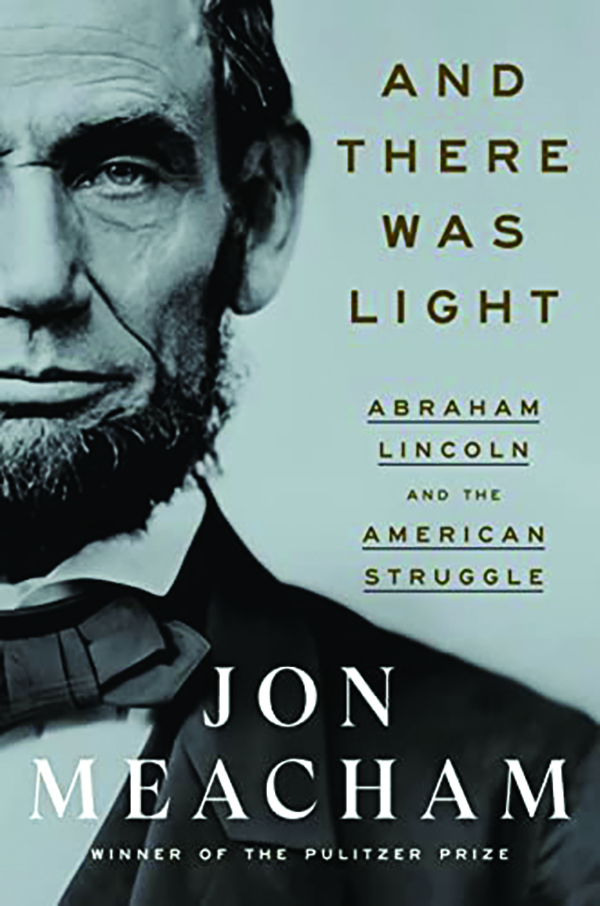
Lincoln’s slow walk
Carl Paulus
In August, with the death of David McCullough at the age of 89, Jon Meacham became the American king of what has been derided by the self-labeled Twitterstorians as “dad history” or “founders chic.” To its critics, “dad history” has been given to “broad, ankle-deep books about U.S. history as a means of soothing the current American psyche.” For everyone else, it’s a readable history that people without expertise can enjoy during their free time.
When readers pick up a Jon Meacham book, they should not expect the most recent theoretical deconstruction of American social or political hierarchy through the contextual lenses of race, gender, and class but rather a lesson learned from famous historical actors that can still be applied today. One will not need a dictionary, and the books may not be part of a Ph.D. reading list, but at least the texts can be discussed among intelligent friends.
In his latest, And There Was Light: Abraham Lincoln and the American Struggle, Meacham aims to chart “Lincoln’s struggle to do right as he defined it within the political universe he and his country inhabited — not to celebrate him for moral perfection, for he was morally imperfect, but to illustrate that progress comes when Americans recognize that all, not just some, possess common rights and are due common respect.” Later in the book, he says Lincoln did “the right thing for practical reasons — a political being pursuing a course grounded in morality.” For the author, an occasional adviser to and speechwriter for President Joe Biden, the 16th president’s “doing right as he defined it” should be an example to those holding office that the results of following one’s conscience offer more in terms of a legacy than any short-term political gain ever could.

Although this advice may appear wise, if not obvious, when discussing Lincoln, this kind of fablelike lesson benefits from knowing what happened in the end — the victory of the Union Army and the end of American slavery. It presumes that following one’s conscience, or “doing the right thing,” isn’t what every leader does, in the past or today. Weren’t Stephen Douglas, Jefferson Davis, George McClellan, Robert E. Lee, and the rest of Lincoln’s challengers following their consciences as events shaped their world and the country fell into violent civil war? Didn’t they also believe that they, to deploy a too-oft-used phrase, were on the “right side of history?” In this light, doing the right thing becomes less important than having the right person. President Lincoln was the right person at the right time.
W.E.B. Du Bois once remarked that Lincoln was “big enough to be inconsistent,” but Meacham, through a compelling narrative, shows how that’s not a particularly fair characterization. He focuses much of his thesis on a comment the president allegedly made to Theodore Parker, a transcendentalist and Unitarian minister who influenced him during his time in Washington: “I walk slowly,” he said, “but I never walk backward.” This is where And There Was Light is at its best. What made Lincoln seemingly inconsistent was also what made him big enough to be so. The president thought about things as he garnered more information and changed people’s minds, including his own.
Meacham’s best takeaway comes in how he shows Lincoln as considerate — a leader willing to adapt, and one who often did, as circumstances transformed over the course of the war. And There Was Light shows that Lincoln’s “bigness” and “inconsistency” came from the way the Great Emancipator worked hard to think about ways he could apply his principles as the war caused the ground to shift beneath his feet. Lincoln knew what he wanted and understood that to get it while defending democracy, he’d need support from the people. The entire point of the American representative government that he defended demanded more than merely being “right.” It requires consensus, which is exactly what Lincoln went about employing the entirety of his political skills to achieve.
And There Was Light portrays a president who is willing to recognize failure and adjust direction when he heard a better argument or realized his plan did not work, even when doing so meant he could be charged with hypocrisy. There is no better example of this than Meacham’s description of Lincoln’s disastrous proposal to Congress to amend the Constitution to abolish slavery by the year 1900, decades in the future, rather than free the enslaved immediately. Fearing that the president had abandoned the Emancipation Proclamation, abolitionists were furious, but Lincoln listened to critiques, realized he was wrong, and simply kept his original plan. The proclamation was signed a few months later.
Responding to one of his congressional critics who accused him of changing his mind, Lincoln replied, “Yes, I have; and I don’t think much of a man who is not wiser today than he was yesterday.” In our modern political era, in which attacks of whataboutisms and feigned outrage over hypocrisy are responded to by leaders doubling down on their direction, the 16th president’s willingness to admit mistakes and alter course in the hope of a better result for the people should stand out.
And There Was Light continues Meacham’s career as a wonderful writer and storyteller. His chapter on Winfield Scott’s preparation for the Senate’s counting of electoral votes at the Capitol shows why he’s such a popular historian. Anyone interested in learning more about Lincoln’s life and a period of history that still resonates today would do well in picking up a copy. Now I know what I’ll be getting my dad for Christmas this year.
Carl Paulus is a historian from Michigan and the author of The Slaveholding Crisis: The Fear of Insurrection and the Coming of the Civil War.
